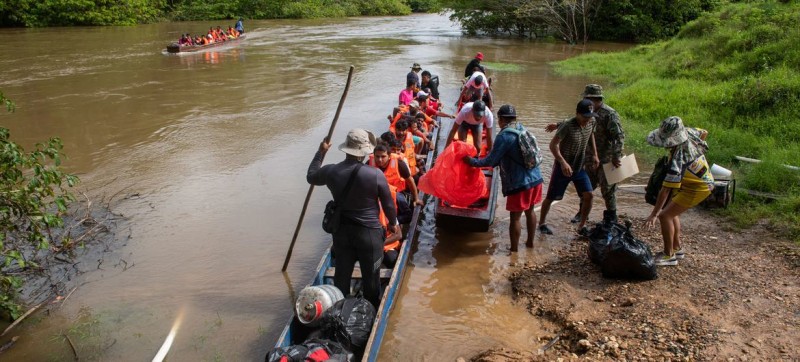Contents
© UNICEF/Eduard Serra From January to October 2022, over 200,000 migrants crossed the Darien Gap to continue to their destination.
The tragic milestone was confirmed in a new report from the International Organization for Migration’s Missing Migrants Project, which also maintains that little action had been taken by any country of origin, transit or arrival.
“While thousands of deaths have been documented across migration routes each year, very little has been done to address the consequences of these tragedies, let alone prevent them,” said Julia Black, co-author of the study.
Tweet URL
Drawing a blank
The nationality for over 30,000 people in the Missing Migrants Project is unknown, which means that more than 60 per cent of those who die on migratory routes remain unidentified. Thousands of families are left “searching for answers”, IOM said.
“As time goes by, there is no news”, IOM said, quoting a Moroccan migrant in Spain in 2021 who was searching for his brother who disappeared 20 years ago on route to Europe.
Of the missing migrants whose nationality could be identified, more than 9,000 were from Africa, over 6,500 from Asia and another 3,000 from the Americas.
“Notably, the top three countries of origin – Afghanistan, Syria and Myanmar – are marked by violence, with many people fleeing their homes to seek refuge abroad”, IOM said.
Deadly legacies
More than half of the 50,000 individual deaths documented occurred on routes to and within Europe, with Mediterranean routes claiming at least 25,104 lives.
European routes also make up the largest number and proportion of missing and presumed dead migrants, with at least 16,032 recorded missing at sea and whose remains have never been recovered.
Africa is the second-deadliest region for people on the move, with more than 9,000 migration-related deaths documented since 2014. Regional household surveys indicate that these figures are almost certainly a vast undercount.
Dangerous routes
And in the Americas, nearly 7,000 deaths have been documented, 4,694 of whom were heading to the United States. The US-Mexico land border crossing alone has seen more than 4,000 deaths since 2014.
IOM has also documented another 6,200 deaths across Asia.
“Children make up more than 11 per cent of the lives lost on migratory routes in Asia, the highest proportion of any region”, according to the reoport.
It noted that of the 717 recorded child deaths linked to migration in the region, 436 were Rohingya refugees.
In Western Asia, at least 1,315 lives have been lost on migratory routes, many of which occurred in countries with ongoing conflicts, which make documentation of the missing extremely challenging.
At least 522 people arriving from the Horn of Africa have died in Yemen – often victims of violence – and 264 Syrian deaths have been documented during attempts to cross the Türkiye border.

© UNICEF/Eduard Serra Lajas Blancas is a migrant reception centre installed in Panama near the border with Colombia.
Action call
IOM stressed that “obligations under international law, including the right to life, must be upheld at all times”.
The UN agency called for international solidarity in prioritizing search and rescue operations; improving and expanding regular and safe migration pathways; and ensuring that legislation prioritizes the protection and safety of people on the move.
“Regardless of the reasons that compel or drive people to move, no one deserves to die in search of a better life”, said IOM’s Ms. Black.




Comments are closed, but trackbacks and pingbacks are open.